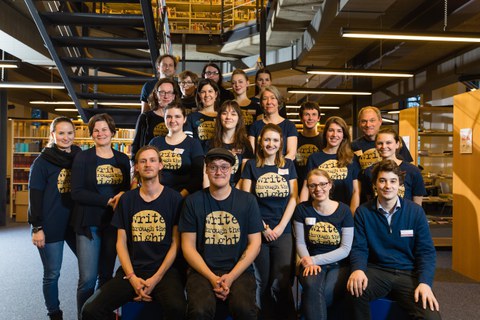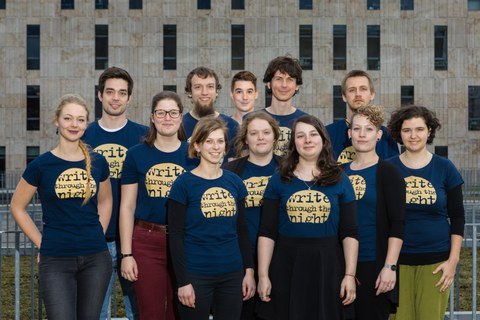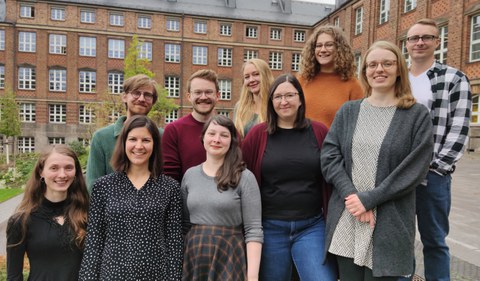Uni-Start: Infos für Erstsemester

Das Team des Schreibzentrums zur Langen Nacht des Schreibens Anfang März 2020.
Herzlich Willkommen zum Studium an der TU Dresden! Damit dein Studium ein Erfolg wird, steht dir das Team des Schreibzentrums der TU Dresden während deines gesamten Studiums beratend und informierend zur Seite - Ganz egal, welches Fach oder welche Fächerkombination du studierst.
Auf dieser Seite stellen wir dir erste Informationen und Einführungsveranstaltungen zum wissenschaftlichen Schreiben und Arbeiten vor:
Inhaltsverzeichnis
Du hast noch nie etwas von einem Schreibzentrum an einer Uni gehört oder kannst dir, "außer, dass man da schreibt" nicht so wirklich vorstellen, wie ein Schreibzentrum dich unterstützen kann? Dann sieh dir dieses kurze Video an:
Hinweis zur Barrierefreiheit: ausführliche Videobeschreibung zum Lesen und Vorlesen lassen auf https://tud.link/25u4
Wenn du dir weiter ansehen möchtest, wie das Schreibzentrum der TU Dresden dich beim wissenschaftlichen Schreiben und Arbeiten unterstützen kann, dann schau dich in unserem Webbereich für Studierende unter tud.de/deinstudienerfolg/szd/fuer-studierende um.
Wissenschaftlich Schreiben lernen - Schritt für Schritt
Geschrieben hast du sicherlich schon viel, in der Schule, vielleicht in deiner Ausbildung oder deinem Beruf, wissenschaftliche Texte aber wahrscheinlich weniger. Aber keine Sorge: Schreiben ist ein Handwerkszeug und erlernbar - und das sogar "learning by doing", also während du schreibst. In einem geisteswissenschaftlichen Studium wirst du in jedem Semester durchschnittlich eine bis drei Schreibarbeiten erledigen und auf jeden Fall eine Abschlussarbeit schreiben. Und auch in mathematisch-naturwissenschaftlichen Studiengängen wirst du vor deiner Abschlussarbeit verschiedene wissenschaftliche Texte verfassen, z. B. Belegarbeiten, technische Berichte und Projektarbeiten.
Im Erwerb der Kompetenzen, die du für das Verfassen deiner wissenschaftlichen Arbeiten benötigst, unterstützen wir dich und haben dir im folgenden Video das "Was" und "Wie" des wissenschaftlichen Schreibens kurz zusammengefasst:
Hinweis zur Barrierefreiheit: ausführliche Videobeschreibung zum Lesen und Vorlesen lassen auf https://tud.link/25u4
Wissenschaftliches Schreiben und Arbeiten wirst du in deinem Studium Semester für Semester besser kennenlernen und dich dabei Semester für Semester darin weiterentwickeln. Denn genauso wie in der Kunst und im Handwerk gilt: Es ist noch kein:e Meister:in vom Himmel gefallen. Und um noch einmal in die Sprichwortkiste zu greifen: Viele Wege führen nach Rom - bzw. zum wissenschaftlichen Schreiben und Arbeiten.
Auch wenn du zum Beispiel in der Schule bereits eine Facharbeit geschrieben und damit keine Probleme hattest, wird sich dein wissenschaftlicher Schreibstil im Laufe deines Studiums sicherlich verändern. Du wirst verschiedene Möglichkeiten kennenlernen, deinen Weg in der Wissenschaft zu gehen und deinen Schreib- und Arbeitsstil zu finden. Wenn du dabei Unterstützung suchst, kannst du dich jederzeit an das Team des Schreibzentrums der TU Dresden wenden. Wir bieten dir Unterstützung z. B. in Workshops, mit verschiedenen Materialien in unserer Infothek auf OPAL und mit einer persönlichen Schreibberatung. (Technischer Hinweis: Damit sich die Links in einem neuen Fenster bzw. Tab öffnen, öffne sie bitte über einen Rechtsklick mit der Maustaste und "Link in neuem Tab/Fenster öffnen".)
Welcher Schreibtyp bist du?
Schreibtypentests können dir helfen, es herauszufinden
Viele Schultexte, gerade in Prüfungssituationen, werden oft ad hoc, d. h. "aus dem Augenblick heraus", geschrieben und nur wenig überarbeitet. Im Studium ist das anders: Ein wissenschaftlicher Text braucht in der Regel verschiedene Überarbeitungsphasen. Welche das sind, kannst du im FAQ auf dieser Seite nachlesen.
Auch wenn es einen typischen Arbeitsverlauf für wissenschaftliches Schreiben gibt, gibt es unterschiedliche Typen bzw. Strategien beim Schreiben und Erarbeiten der Textinhalte. Eine mögliche Typisierung spricht von "strukturfolgend" und "strukturschaffend":
- Die einen recherchieren vorab gründlich, überlegen sich vor den ersten Sätzen genau, was sie schreiben wollen und überarbeiten den Inhalt dann weniger. Dieser Typ heißt "strukturfolgend", da zuerst eine Textstruktur erarbeitet wird, bevor der Text selbst entsteht.
- Andere schreiben erst einmal drauflos, recherchieren danach tiefergehend und überarbeiten ihren Inhalt gründlich am Textentwurf. Dieser Typ heißt "strukturschaffend", da die Struktur des Textes, grob gesagt, während des Schreibens erschaffen wird.
Beides ist vollkommen in Ordnung, denn beide Wege führen zum Ziel. Wenn du heraus finden möchtest, welchem Typ du bisher eher entsprichst, dann überlege kurz, welchen Text du zuletzt geschrieben hast und beantworte daran denkend die Fragen in den folgenden Quizzen:
Hinweis: Damit sich der jeweilige Test in einem neuen Fenster öffnet, öffne ihn bitte über einen Rechtsklick mit der Maustaste und "Link in neuem Tab/Fenster öffnen".
- Selbsttest: Schreibtypentest "Struktur schaffend oder folgend?" (kurz, online über ONYX ohne Anmeldung)
- Selbsttest: Schreibtypentest "Struktur schaffend oder folgend?" (lang, PDF)
Am Ende der Tests erhältst du jeweils eine Punktzahl und kannst damit einschätzen, zu welchem Schreibtyp du tendierst und was das für dich bedeutet. Wichtig ist dabei: Eine Person entspricht selten genau einem Typen und du kannst die unterschiedlichen Typen und ihre Schreibstile im Verlauf deiner Schreibarbeiten und deines Studiums ausprobieren, um heraus zu finden, wie du am besten arbeiten kannst.
Es gibt verschiedene Ansätze, sich mit seinen Schreibstrategien zu beschäftigen und sich unterschiedlichen Typen zuzuordnen. Eine weitere Typologie unterscheidet zwischen Goldgräber/in, Eichhörnchen, Abeneteurer/in und Zehnkämpfer/in - Wozu du tendierst, kannst du im Test herausfinden.
Hinweis: Damit sich der Test in einem neuen Fenster öffnet, öffne ihn bitte über einen Rechtsklick mit der Maustaste und "Link in neuem Tab/Fenster öffnen". Dieser Test funktioniert ausschließlich im Internet Explorer.
Am Ende der Tests erhältst du jeweils eine Punktzahl und kannst damit einschätzen, zu welchem Schreibtyp du tendierst und was das für dich bedeutet. Wichtig ist dabei: Eine Person entspricht selten genau einem Typen und du kannst die unterschiedlichen Typen und ihre Schreibstile im Verlauf deiner Schreibarbeiten und deines Studiums ausprobieren, um heraus zu finden, wie du am besten arbeiten kannst.
Die verschiedenen Schreibtypen "Goldgräber/in, Eichhörnchen, Abenteurer/in und Zehnkämpfer/in" erklären unsere Kollege/innen vom Schreibzentrum Frankfurt am Main in diesem Video auf YouTube:

Das Team der Schreibtutoren/innen zur Langen Nacht des Schreibens 2018.
Wenn du Fragen zu einem Test, den Schreibtypen oder zu einem anderen Thema rund um wissenschaftliches Schreiben und Arbeiten hast, dann melde dich gern jederzeit entweder für ein persönliches Gespräch in einer Schreibberatung mit den Schreib-Peer-Tutor/innen des Schreibzentrums (online oder in Präsenztreffen, weitere Informationen findest du auf der Webseite der Schreibberatung.
FAQ - typische Fragen und erste Antworten
Wie gesagt: Wissenschaftliches Schreiben und Arbeiten kann man lernen, und auch dafür ist dein Studium gedacht. Einen Überblick zu verschiedenen Methoden, mit denen du deine wissenschaftlichen Texte erarbeiten und schreiben kannst, findest du in der Starthilfe Schreiben (PDF, noch nicht barrierefrei). (Technischer Hinweis: Damit sich das PDF in einem neuen Fenster bzw. Tab öffnet, öffne es bitte über einen Rechtsklick mit der Maustaste und "Link in neuem Tab/Fenster öffnen".)
Antworten auf Fragen, die viele Studierende am Anfang des Studiums haben, findest du in diesem FAQ:
Der Schreibprozess an einem wissenschaftlichen Schreibprojekt ist sehr komplex, was unter anderem an der Vielfalt der Aufgaben liegt, die bewältigt werden müssen. Das eigentliche Schreiben ist nur ein Teil davon. Recherchieren und Lesen gehören gleichermaßen dazu wie auch die Planung davor und das Überarbeiten am Schluss. Einen Überblick zu den Phasen wissenschaftlichen Arbeitens und Schreibens findest du in unserem Handout zum Überblick über Arbeitsphasen mit dem "Schreibdrachen".
Wie diese einzelnen Arbeitsschritte nun geordnet werden, ist jedem selbst überlassen. Manche arbeiten strukturiert eine Phase nach der anderen ab, während andere im Ping-Pong-Stil hin und her springen, weil sich z.B. aus dem Lesen neue Recherchen ergeben haben. Wichtig ist, dass man sich jeder dieser Schritte oder Phasen bewusst ist und dementsprechend Zeit für sie einplant. Du weißt noch nicht, welcher Schreibtyp du bist? Unterstützung bei dieser Frage bietet dir der Schreibtypentest.
Literaturtipps
Esselborn-Krumbiegel, Helga: Von der Idee zum Text. Eine Anleitung zum wissenschaftlichen Schreiben, Paderborn 2008. S. 16 – 23. (Kapitel: Phasen der Textproduktion)
Für die tägliche Schreibzeit gibt es die Empfehlung: Nicht mehr als vier Stunden, da im Normalfall die Effektivität danach stark abnimmt. Allerdings unterschlagen solche Richtwerte, dass die Leistungsfähigkeit individuell variiert. Viel wichtiger, als sich an eine vorgegebene Zeitangabe zu halten, ist es, seine eigene Arbeitsweise zu reflektieren. Fragen, denen auf jeden Fall nachgegangen werden sollte, sind:
- Arbeite ich morgens oder abends besser?
- Wie sieht meine persönliche Leistungskurve aus? (Tipp: Bei den meisten Menschen liegt das Tief irgendwann zwischen 12 und 16 Uhr.
- Zu welcher Zeit des Tages habe ich die wenigsten bzw. keine Störungen zu erwarten?
Eine ganz entscheidende und grundsätzliche Frage, die gerne unter den Tisch fällt, ist: Wann schreibe ich und wann nicht? Hier klingt schon an, was ebenfalls ganz wichtig ist: Das Einplanen von Pausen! Das Arbeiten nach der Pomodoro-Technik hilft dabei, regelmäßige Pausen einzuhalten. wie die Pomodoro-Technik funktioniert, zeigen wir dir in diesem Handout aus unserer Infothek.
Literaturtipps
Esselborn-Krumbiegel, Helga: Von der Idee zum Text. Eine Anleitung zum wissenschaftlichen Schreiben, Paderborn 2008. S. 24 – 29. (Kapitel: Die Zeitschiene)
Rost, Friedrich: Lern- und Arbeitstechniken für das Studium, Wiesbaden 2004. S. 101 – 113. (Kapitel: (Zeit-)Planung und effizientes Arbeiten)
Gleich vorab: Ja, den gibt es. Viele wissenschaftliche Texte mögen zwar den Eindruck vermitteln, ihr Informationsgehalt sei in ein striktes sprachliches Korsett gepackt, sodass ein eigener sprachlicher Stil in der Wissenschaft gar keinen Platz hat. So strikt sind die sprachlichen Normen allerdings nicht. Das liegt allein schon an den unterschiedlichen Arbeitsweisen in verschiedenen Disziplinen und Kulturkreisen. Wichtig ist, sich klar zu machen, dass man als Autor oder Autorin in den Dialog mit der Forschungsgemeinschaft tritt. Der Text soll also Wissen an andere vermitteln, wodurch ein Kommunikationsprozess entsteht. Dieser folgt einigen Prinzipien, nämlich dem der Exaktheit, der Eindeutigkeit und der Neutralität bzw. Objektivität. Hält man sich an diese Prinzipien, die den Rahmen vorgeben, kann man dem eigenen Text eine eigene Note geben und selber einen persönlichen wissenschaftlichen Stil entwickeln. Sprich darüber auf jeden Fall mit deiner Dozentin bzw. deinem Dozenten.
Unser Schreibtutor Robert hat zu diesem Thema außerdem eine Videoreihe aufgenommen, die du dir bei Youtube ansehen kannst: Wie schreibe ich wissenschaftlich? Aufgezeichneter Workshop als Videoreihe auf dem YouTube-Kanal des Schreibzentrums.
Literaturtipps
Auer, Peter und Baßler, Hager (Hrsg.): Reden und schreiben in der Wissenschaft, Frankfurt am Main 2007. S. 9 – 29. (Kapitel: Der Stil der Wissenschaft)
Esselborn-Krumbiegel, Helga: Richtig wissenschaftlich schreiben, Paderborn 2010. S. 11 – 22 . (Kapitel: Grundlagen wissenschaftlicher Sprache)
Eine gute Fragestellung fasst das Ziel einer wissenschaftlichen Arbeit pointiert und nachvollziehbar zusammen. In ihr formuliert der Autor oder die Autorin das Erkenntnisinteresse und grenzt das behandelte Thema ein. Sie bietet dadurch sowohl den Leser/-nnen als auch dem oder der Schreibenden einen fassbaren Orientierungspunkt und leitet gezielt durch die meist sehr umfangreiche Thematik, mit der sich die Arbeit befasst.
Eine Methode, die dir helfen kann, eine gute Fragestellung zu entwickeln, ist der Dreischritt.
Ein wesentliches Prinzip wissenschaftlichen Arbeitens ist das der Nachvollziehbarkeit. Fremde Gedanken sind für die eigene Argumentation erwünscht und auch erforderlich. Sie müssen aber auch als solche gekennzeichnet und dadurch klar von den eigenen unterscheidbar sein. Textstellen, die nicht als Zitat gekennzeichnet sind, werden einem selber zugeschrieben. Übernimmt man also Gedanken anderer Autor/-nnen, ohne dies kenntlich zu machen, beansprucht man fremdes Eigentum als das eigene und begeht damit geistigen Diebstahl.
weiterführende Tipps:
Göttert, Karl-Heinz: Kleine Schreibschule für Studierende, München 2002. S. 35 – 39. (Kapitel: Zitate und Fußnoten)
Überblick über gängige Begriffe und Abkürzungen auf dem Citavi-Blog
Link zu YouTube: Warum zitieren wir? Ein Erklärfilm des Bibliothekertags 2017.
Auer, Peter und Baßler, Hager (Hrsg.): Reden und schreiben in der Wissenschaft, Frankfurt am Main 2007.
Esselborn-Krumbiegel, Helga: Von der Idee zum Text. Eine Anleitung zum wissenschaftlichen Schreiben, Paderborn 2008.
Esselborn-Krumbiegel, Helga: Richtig wissenschaftlich schreiben, Paderborn 2010.
Göttert, Karl-Heinz: Kleine Schreibschule für Studierende, München 2002.
Rost, Friedrich: Lern- und Arbeitstechniken für das Studium, Wiesbaden 2004.
Online-Workshops zum Ausprobieren
Die Schreib-Peer-Tutor:innen des Schreibzentrums bieten verschiedene Workshops an, die auch speziell für Studierende im ersten Semester sehr hilfreich sein können. Das aktuelle Workshopprogramm findest du auf unserer Webseite für Studierende unter "Workshops".
Einige Workshops, kurze Tutorials und Podcasts kannst du dir auch auf dem YouTube-Kanal des Schreibzentrums ansehen bzw. anhören:
- Podcasts LateBirds: Christina, Kiron und ab und an ein Gast tausschen sich über Methoden und Schreibtipps aus, die ihnen im Studium weiterhelfen.
- Playliste Praxistipps aus der Schreibberatung: Schreib-Peer-Tutor Andrej hat Tipps zu Themen zusammengestellt, die in Schreibberatungen immer wieder eine Rolle spielen: zu Schreibgewohnheiten, zum Zeitmanagement und zum Überarbeiten von Texten.
- Pausen sind wichtig: kurze 5-Minuten-Yoga-Pausen hat Tutorin und Yoga-Lehrerin Isabelle für dich aufgenommen.
Noch mehr Tipps, Videos und Podcasts des Schreibzentrums findest du in unserer Infothek auf OPAL und abonniere unseren aller zwei Monate erscheinenden Newsletter mit Tipps und aktuellen Angeboten des Schreibzentrums.
 © TUD
© TUD
Schreibzentrum der TUD
Eine verschlüsselte E-Mail über das SecureMail-Portal versenden (nur für TUD-externe Personen).
Besuchsadresse:
Fritz-Foerster-Bau, Raum 108 Mommsenstr. 6
01069 Dresden
Postadresse:
Technische Universität Dresden
Zentrum für Weiterbildung/
Schreibzentrum der TUD
01062 Dresden
Das Schreibzentrum der TU Dresden (SZD) ist die zentrale Anlaufstelle rund um das akademische Schreiben und Lesen. Das SZD unterstützt Studierende und Lehrende u. a. mit Angeboten zum Planen und Schreiben verschiedener Texte im Studium wie Belege, Protokolle, Seminar- und Abschlussarbeiten und zur Vermittlung des akademischen Schreibens in Lehre und Betreuung.
Alle Informationen zu weiteren Angeboten und Möglichkeiten der Unterstützung, auch speziell für das Online-Semester, sind auf der Webseite des Schreibzentrums zu finden.
Du hast Fragen?
Schreibe uns einfach kurz eine E-Mail an .

Das Team des Schreibzentrums im Herbst 2024.




